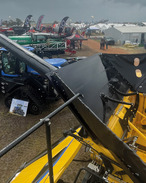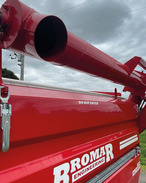The glasshouse is located at Murdoch University's new grains research precinct and was constructed by ClearVue Technologies using three different versions of its transparent solar photovoltaic glazing panels.
The sate-of-the-art facility will be used by Murdoch University's internationally renowned geneticist, Professor Chengdao Li and his team, with a view to developing new plant breeding technologies and integrating them to produce commercial crop varieties.
Kondinin Group's 2019 Researcher of the Year Award winner, Professor Li, said the ClearVue greenhouse is revolutionary for both worldwide food production and research.
"Short term data will be available within the first three months with information about how the glasshouse is running. In six months we will have data on winter crops and after that summer crops will be grown. By March 2022 there will be data and information available for the whole cycle of winter and summer crops grown in the glasshouse," Professor Li said.
ClearVue Technologies Limited executive chairman, Victor Rosenberg, said ClearVue is truly excited to be working with Professor Li and his team at Murdoch to support agricultural research that is intended to improve global environmental, food and health outcomes.
The facility was constructed using a $1.6 million grant from the Australian Federal Government's AusIndustry Cooperative Research Centre Projects program and completed with the assistance from Edith Cowan University (ECU) and construction partner, blanc.
The greenhouse utilises clear solar glass that not only lets natural sunlight through but also generates power using the unwanted UV and IR light wavelengths and converts these to power from photovoltaics at the perimeter of the window.
The ClearVue technology used in the greenhouse was developed over the past 10 years and is now available for sale for use in high-rise, large-scale construction and agriculture.
The ClearVue greenhouse incorporates a range of sensors that record and present an array of data in real time providing scientists with accurate information relating to conditions like temperature, humidity, and the actual amount of light that plants receive.
This information is quickly analysed to make automatic adjustments to air conditioning, lighting, fans, louvres, blinds and reticulation systems, which in turn allows scientists to maintain a constant microclimate that provides optimum growing conditions, all while being powered by the energy generated by the ClearVue glass.
The ability to control the microclimate within the ClearVue greenhouse creates an optimum growing environment to achieve higher yields. Leafy plants require protection from harmful UV rays. Plants do this naturally by producing a waxy substance that shields them from the UV rays.
ClearVue glass blocks these UV rays, so the energy required by plants to create the protective layer of leafy vegetables can be redirected to growing bigger, tastier, fresher produce which leads to improved yields and quality of produce.
Prior to the official opening of the greenhouse, ClearVue Technologies announced a five-year licence agreement with Japanese agribusiness Tomita Technologies, which has been a leading greenhouse supplier for more than 70 years.
The agreement opens the path to a potentially lucrative Japanese market where greenhouse food production is well understood and broadly utilised.
























